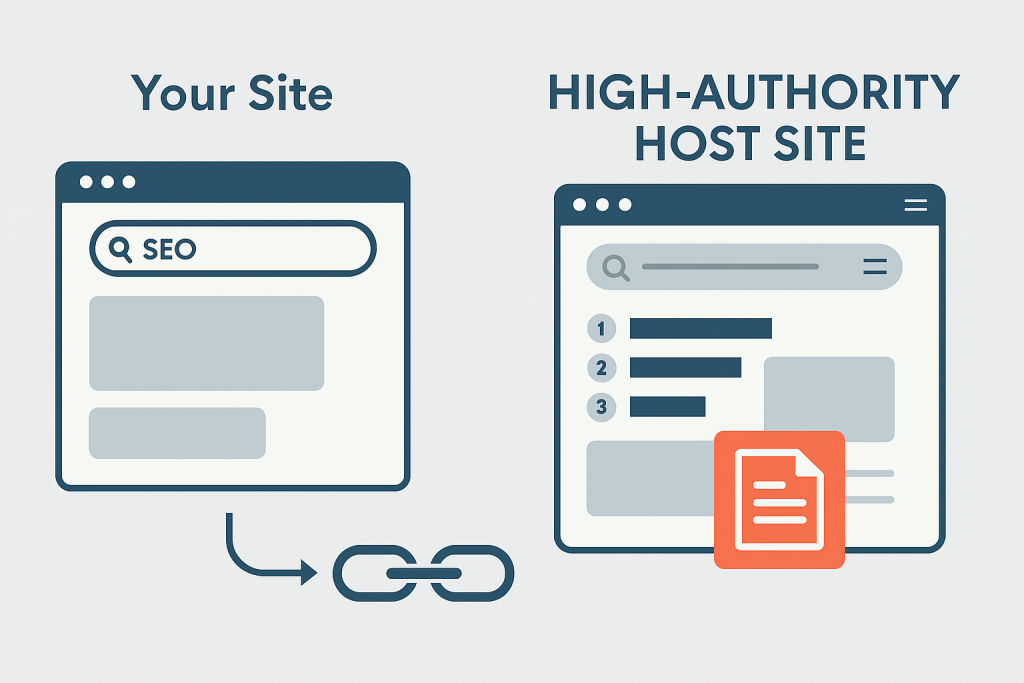Parasite SEO has become a hot topic among digital marketers over the past year. On one hand, it promises quick wins, leveraging big-name sites to get visibility for tough keywords. On the other, it carries risk: losing control, risking penalties, or seeing results that disappear. In this blog, we’ll break down what parasite SEO really is, how it works, where it helps, where it hurts, and how you can use it safely if you choose to.
What Is Parasite SEO?
Parasite SEO describes the strategy of publishing content on high-authority third-party websites (hosts) instead of, or alongside, your own site, in order to leverage their domain strength to rank content for competitive keywords.
It includes approaches like guest posts, sponsored content, contributions to blogs or media sites, user-generated content, or posting on platforms like Medium, Reddit, or LinkedIn. The idea is: instead of waiting for your site to build authority, you ride on someone else’s established reputation.
How Parasite SEO Works
Here’s the typical flow:
- Find High-Authority Hosts
You identify websites or platforms that already rank well, have strong domain authority, trust, and audience. These sites might allow guest posts, contributions, or content submissions. - Keyword & Topic Research
You pick competitive keywords or topics that are hard to rank for on your own site. Then you craft content that targets those keywords but publish it on the host domain. - Publish Content with Links & SEO Elements
You optimize the content just as you would on your own site—title tags, meta descriptions, internal/external links and include strategic backlinks to your own website where allowed. - Promotion & Monitoring
After publishing, you share the content (social media, email, etc.), track performance (traffic, rankings), and see how much of the host’s authority is boosting your visibility.
Short-Term Benefits You Can Get
Parasite SEO has clear advantages, especially when time, brand reputation, or budget are constrained:
- Faster Ranking for competitive keywords, thanks to domain authority of the host site.
- Built-in Audience & Exposure, since host sites already have an audience and traffic. Your content can be discovered by people browsing that site.
- Lower Initial Investment compared to building your own domain’s authority through link building and content over time.
These benefits can make parasite SEO very attractive as a “quick win” or a way to test new content ideas and get visibility early.
Risks & Potential Downsides
However, it’s not without danger. Some of the pitfalls include:
- Lack of Control over content once it’s published, you may not be able to update it, the host may change or remove it, or policy changes may affect it.
- Branding issues – since the content is on someone else’s domain, you often get less visibility for your own brand name. The audience might remember the host, not you.
- Google Penalties & Policy Risks, especially under Google’s “site reputation abuse” policy, which targets content that abuses host site authority or publishes low-value or irrelevant content to manipulate ranking signals.
- Temporary Nature of Results, visibility may drop if the host site loses authority, changes rules, or removes content. Your performance on such content tends to be less stable.
Ethical Parasite SEO vs Black-Hat
Not all parasite SEO is bad or unethical. The difference lies in how you use it.
White-Hat / Ethical Parasite SEO involves:
- Publishing useful, high quality content that genuinely adds value to the host’s audience.
- Making sure content adheres to host site guidelines and policies.
- Transparency in backlinks and disclosures if required.
Black-Hat / Risky Parasite SEO tends to include:
- Using hosts with lax oversight and publishing low-quality content purely for ranking.
- Keyword stuffing, misleading content, or irrelevant topics.
- Sponsored or affiliate content that is hidden, not disclosed, or irrelevant to the audience.
Google is increasingly penalizing hosts or articles that fall under site reputation abuse. So doing things ethically matters not just for reputation, but also for staying visible.
When It Makes Sense to Use Parasite SEO
Here are situations where parasite SEO can be especially useful:
- New sites or brands which have little domain authority but want faster visibility.
- Launching a new product or campaign, where time is of the essence.
- Testing content ideas or keywords before investing hard in your own site’s content or backlink profile.
- Seasonal or trend-based content, where you need to capture traffic quickly.
If your goal is long-term brand building, strong domain authority, and stable organic traffic, parasite SEO should be just one part of a broader SEO strategy.
How to Do Parasite SEO the Right Way
If you decide to try parasite SEO, here are best practices to make sure you don’t shoot yourself in the foot:
- Choose hosts with relevance and good reputation. If the site aligns with your niche, your content fits better and gets more value.
- Create content that is genuinely helpful, deeply researched, and well written. Even though it’s for someone else’s site, your reputation is still on the line.
- Optimize content fully, good title, meta, headings, internal links (if possible), images, etc. Treat it like you do your own posts.
- Use backlinks carefully, don’t overdo them, make sure they feel natural. If possible, link to high-value pages on your site.
- Monitor performance over time. If something loses traction or you see very short visibility, analyze whether it’s the host site changes, content quality, or keyword relevance causing it.
Real Examples
- Ahrefs has a great explainer on parasite SEO, showing cases where sites used high authority hosts to rank for very competitive keywords (sometimes successfully, sometimes temporarily) and how Google’s penalties have affected those results.
- SEO practitioners have published on Medium, LinkedIn, Reddit to test keyword ideas. In many cases, such content gets indexed quickly and ranks for specific keyword queries—sometimes even beating their own site’s content initially.
Long-Term Perspective: Is It Sustainable?
Parasite SEO may get quick wins, but for long-term success you’ll need:
- Your own site’s authority to grow with strong content, user experience, technical SEO, and backlink strategy.
- Diversification: relying too much on external platforms makes you vulnerable to policy changes.
- Building brand equity so users ultimately recognize and trust your site, not just the host domain.
Conclusion
Parasite SEO is like using a fast lane on a highway: you can cover ground quickly, but the lane has rules, and you might get pulled over if you break them. When used wisely, it can yield real benefits: faster rankings, exposure, testing ground for new content ideas. But when abused, it risks reputation, penalties, and fragile gains.
If you’re trying it, do so with caution. Use it ethically. Don’t neglect building your own site’s strength. Balance parasite SEO with long-term foundational SEO work. That way, you get both speed and sustainability.



